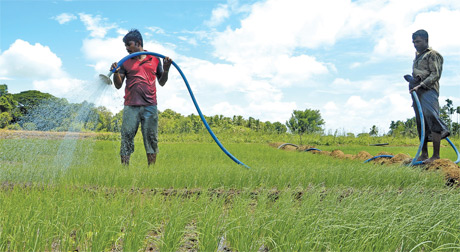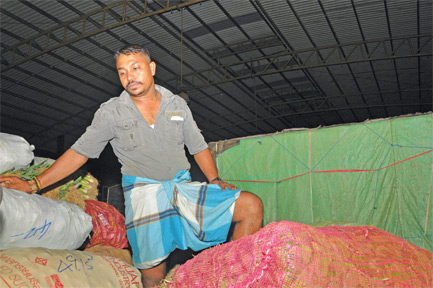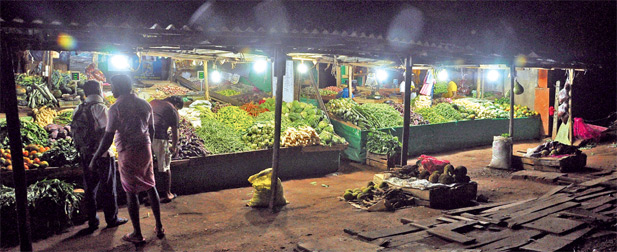|
 Vegetables prices volatile: Vegetables prices volatile:
Solutions to issues in agro products market vital
By Gamini Warushamana
Vegetable prices increased to unprecedented levels in recent months
and still remain high. As usual, the main reason for the rise in prices
was short supply. However, the prices of this perishable commodity are
highly volatile.
Despite various issues in the supply chain, the vegetable trade at
the Dambulla Dedicated Economic Centre (DDEC) is competitive and prices
are determined by supply and demand.
DDEC is the main wholesale market for vegetables and is usually a
busy place from morning till midnight where thousands of lorries,
tractors and other vehicles arrive either to sell or purchase
vegetables.
However, these days the market is empty and traders said that
business activities have come down by around 60 percent. Supplies from
Jaffna and Kilinochchi in the North are not coming in as the drought has
hit cultivation. There were a few varieties of upcountry vegetables from
Kandy and Nuwara Eliya.
Low quality
Large stocks of pumpkin from Villachchiya and Thantirimale in the
Anuradhapura district remained unsold. A week ago, the price of pumpkin
in the retail market increased to over Rs.160 per kg, one of the highest
recorded in recent years.
|

R. B. Sirisena |
With the price increase, farmers rushed to harvest and even immature
fruits were plucked. The result was a huge supply but of low quality and
the price came down to Rs.15 per kg by Tuesday.
On Monday, the price of green chillies was Rs. 520 per kg and on
Tuesday the price increased to Rs. 630 due to short supply. These
examples show the highly competitive nature of trading in this market.
It is clear that the prices are sensitive to market signals. Therefore,
the nature of this business should be taken into account in finding a
solution to the prolonged issues in the agro products market.
Farmers who successfully cultivated vegetables this season have
gained by this price increase. Farmers specially in Nuwara Eliya, Kandy
and Welimada got a bonanza this year.
Janaka Weerasinghe, a dealer and farmer from Marassana, Kandy said
that farmers earned huge profits after several years. He had brought
beans and tomatoes which fetched Rs.130 per kg and Rs.150 per kg, the
highest price he had received in the last three four years, he said.
The retail price of vegetables in the retail market just outside the
walls of the DDEC is over 100-200 percent higher and traders said that
the margin is always over 100 percent because of the perishable nature
of the commodity.
Unsold
Trading at the retail market too is low and according to traders,
consumers cannot afford the high price. For instance, consumers don't
buy green chillies which is now over Rs. 500 per kg and a retailer said
that the four kilos he purchased a week ago was still unsold.
P. Prasanna, a mobile trader from Melsiripura, said that they cannot
sell vegetables at the present price at rural fairs. "I usually carry 10
sacks of beans and eight boxes of tomatoes and equal quantities of other
vegetables to sell at weekly fairs. But now I can sell only three to
four sacks of beans and one box of tomatoes," he said. He said that most
of the small-scale traders cannot do business under this situation.
This volatility of agro product prices between two extremes is
frequent and as a result consumers and farmers suffer. Its impact on the
national economy is also huge because agriculture accounts for 10.8
percent of the GDP and contributes 30.6 percent of employment
opportunities.
Complex
The DDEC creates newspaper headlines either when prices of vegetables
are exorbitantly high as a result of short supply or when prices
nosedive due to huge oversupply and vegetables are dumped.
Although the recent price increase is not a surprise, the issues
behind the short supply of vegetables is complex.
|

P Prasanna |
The drought is not the sole reason for low production and farmers in
Matale, Dambulla and Sigiriya said that continuous market failure and
huge losses faced by farmers was the main reason for low production.
They said that over the past three to four years they continuously
faced losses due to market failure.
The high cost of production was the main issue. High labour costs,
the high price of seeds, widespread pest and other plant diseases and
the cost of agro chemicals pushes up the cost of production.
However, farmers cannot determine prices and they also don't have
bargaining power as the products are perishable.
"We sold our products below the cost of production for several years
continuously and therefore, this year we shifted to other crops", said
W. M. Tharanga, a farmer in Kandalama.
They now cultivate big onion, soya bean, maize, kurakkan, sweet
potatoes and fruits such as papaya, dragon fruit and watermelon.
Therefore, vegetable cultivation has declined.
The impact of climate change and resulting extreme weather and
changes in the rainfall pattern are also reasons for the present crisis.
Farmlands specially in the Mahaweli areas are now experiencing this
scenario.
Resident Project Manager of the Hurulu Ela zone of the Mahaweli
Authority, R.B. Sirisena said that the impact of climate change has to
be seriously taken into account and adaptation is essential to face the
new challenges.
This zone is fed by water from Kothmale reservoir through Polgolla
and Bowathenna and is one of the main rice and vegetable cultivation
areas in the country.
Kalundewa, Sigiriya, Palugaswewa, Galkiriyagama and Madatugama are
the main farmlands in this Mahaweli zone. Dambuluoya and Kandalama tanks
store water received from the Mahaweli system and feed the farmlands.
Other crops
According to Sirisena, by last week the water level of the Kothmale
reservoir was 75 percent of capacity and the water level of the Dambulu
Oya and Kandalama tanks were 48 and 46 percent. Water was issued for the
Yala season by the end of May and was delayed due to a water shortage in
the Kothmale reservoir.
Due to the scarcity of water, paddy cultivation this Yala season was
limited and in Madatugama it was limited to 50 percent and in the
Galkiriyagama area paddy cultivation has not been permitted.
Farmers have been advised to cultivate other crops that need less
water and specially import substitutes so that there will be no
marketing issues.
Sirisena said that even under these circumstances uninterrupted water
supply to cultivated lands cannot be assured because everything will
depend on the water level of the Kothmale reservoir.
"If the water level drops below 40 percent we will stop the release
of water to farmlands as we have to ensure the supply of drinking water
to the people. We have an efficient water management system and we work
closely with farmer organisations.
|

The retail market outside the DDEC |
One relief is that the farmers are now risk averse and a majority of
the farmers have willingly cultivated other crops. In this zone, over
2,250 hectares of other crops has been cultivated and we have to supply
water to the farmlands until September," Sirisena said.
Rain water
Sirisena said that the Mahaweli zone is experiencing the adverse
impact of global warming and climate change since 2012.
"The 2012 Yala season failed totally and we have now named Hurulu Ela
and Mahaweli H-zone as water scarce areas. Therefore, we are compelled
to reduce rice farming and encourage farmers to shift to other crops. In
the Maha season paddy cultivation is not an issue because there is
sufficient rain water.
In addition to the water scarcity, the change in the weather pattern
is a serious issue and farmers cannot guess and make cultivation
decisions," he said.
Farmers too confirm this and said that one major reason for the short
supply of vegetables was the unexpected heavy rain in April and early
May which destroyed vegetable cultivations in the Matale and Mahaweli
areas.
The delay in the issue of water from Dambulu Oya and Kandalama tanks
too is a major reason for the short supply of vegetables. According to
farmers, traditionally, they do not plant seeds in June, July and August
because the dry and windy climate affects the crops.
A farmer in Sooriyagama, S.W. Asela Rupasinghe said that they usually
complete the Yala season cultivation before June, but this year they are
still preparing the land. Most farmers have abandoned cultivation and
even those who cultivate face several issues. Therefore, a decline in
vegetable prices cannot be expected in the near future. |

